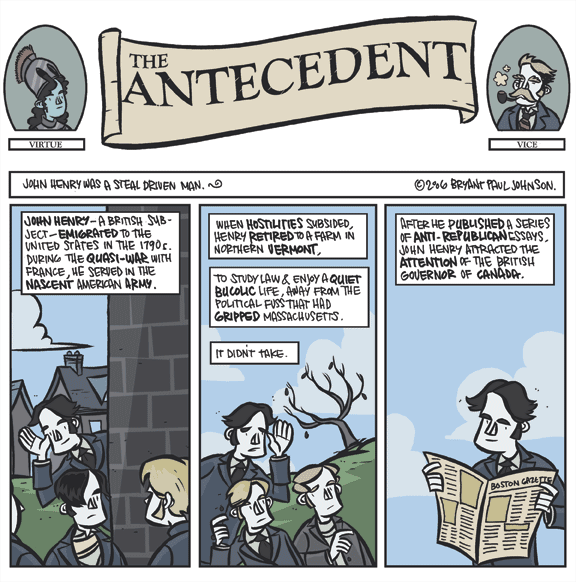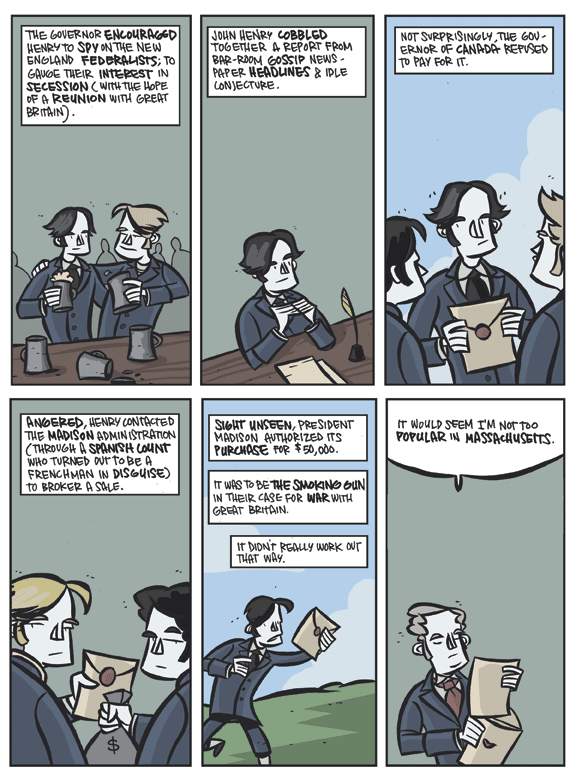

Endnotes
John Henry was a steel driving man. No wait, John Henry was an Irishman. And a British subject. He emigrated to New England in the 1790s at the peak of American Federalism (which may account for his strong dislike for Jefferson’s Republicans).
After retiring from the Army, he relocated to northern Vermont to farm and study law (presumably falling asleep during the ethics part of the curriculum). Also to write anti-republican diatribes. Let’s not forget that. In 1809, after reading some of his work, Sir James Craig, the British governor of Canada hired Henry to spy on the Federalists. It was well known in Great Britain that the New England Federalists were unhappy. Many Boston essays and pamphlets found their way to England where they enjoyed a life renewed in British newspapers (for example, Massachusetts Senator Timothy Pickering’s [the leader of the so-called Essex Junto] letter to Governor James Sullivan was more widely circulated in British newspapers than in American newspapers). John Henry was sent to Boston to measure their unrest and to ascertain if secession was likely (and if it was likely, to help shepherd the wayward states back into the Empire’s fold).
Henry’s methodology has long been criticized. As implied above, Henry gathered his material from bar-rooms, coffee houses and broadsides. His conclusions were so obvious that his services were dismissed when his report was presented to the Governor of Canada.
John Henry may have been a poor spy, but he wasn’t an idiot. He realized that the likeliest bidder for his services was the party who stood to gain the most from details of a Federalist plot to secede. Through his confidant, the Spanish Count de Crillon (who in turn had a connection to President James Madison’s Secretary of State [and future president] James Monroe) he arranged the sale of his research to the Republicans. He was to split the money with the Count de Crillon. Of course, to make things slightly more interesting, the Spanish Count de Crillon wasn’t really Spanish. He was a Frenchman named Paul-Emile Soubiron. One must assume that this deception was necessary to facilitate the transaction. Who stood to gain the most from a war between the United States and Great Britain? France; Great Britain’s centuries old dance partner.
John Henry sold his report to the Republicans for one reason: money. He knew that Madison and his cabinet were looking for any evidence of perfidy on the part of the New England Federalists, and figured that his report, commissioned by the British government met that requirement. Since it proved of no value to the British or the Canadians, selling it to the government of the United States made fiscal sense. Through his intermediary, Henry implied that his research pointed to a Federalist conspiracy to secede. It did. Sort of. It pointed to a Federalist plan for secession that had withered on the vine and died years earlier, or was little more than idle (and frustrated) speculation.
What the Madison Administration hoped the Henry Papers (as they came to be known) would do was to galvanize public opinion against Britain and in support of war measures. With that criteria, the Henry Papers were a disappointment. (They were a disappointment for a number of reasons: methodology, timeliness, obviousness…)
New England Federalists mocked Madison for spending $50,000 — in public money — for a report that could have been given by anyone who spent a couple of days in Boston. They accused Madison of purchasing intelligence of dubious quality for partisan gain. They accused Madison of trying to influence the outcome of the 1812 gubernatorial race (See The Antecedent #4). And they did everything they could to stand in the way of his military and foreign policy plans.
They weren’t, however, completely without value. While they failed to galvanize the Northern states to Madison’s cause, they convinced Madison that Great Britain (and by extension Canada) was actively trying to interfere in the economic and political machinations of the United States; they convinced Madison that the European super-powers still didn’t respect the autonomy of the United States, and wouldn’t without a show of force; they convinced Madison that economic incentives (embargo and non-intercourse) wouldn’t be sufficient to alter Great Britain’s foreign policy.
And so the United States went to war for the first time as a nation. And it did so poorly. Very poorly. Without a coherently organized military (a standing Army and Navy ran counter to Republican ideals; they were the tool with which government could oppress the people, as evidenced by the Whiskey Rebellion, during which President Washington and Secretary Hamilton marched a militia into western Pennsylvania to oblige its population to pay a burdensome tax on alcohol) the United States fumbled its chance to strike Canada before Great Britain could mobilize (and more urgently, before winter could mobilize, which if you’ve ever visited Canada, strikes in mid-May or something). When they did mobilize, they did so under incompetent leadership (the military was mostly comprised of “political generals” who were appointed for their political connections rather than for their skills and veterans of the American Revolution still married to archaic strategy useless against the highly organized British) with results that varied from comical (building ships on a river too shallow to permit their passage) to monstrous (the burning of York; luring Native Americans into battle and using that as an excuse to slaughter them). Neither Great Britain or the United States really wanted or needed this war. Great Britain wouldn’t be able to conquer the United States without re-opening the colonial can-of-worms of 1776, while the United States had no real chance of ever seriously competing with the Royal Navy. It was a stalemate before it began. Diplomatic negotiations continued throughout the fighting and were settled before any serious damage was done to either side. Other than the White House. That was burned down (in retaliation for the burning of York).
The War of 1812 (as the war that lasted from 1812 to 1814 is known) accomplished nothing tangible. Contrary to the hopes of the War Hawk congress, no territory was gained (or lost). The end result was essentially a return to the status quo, with one notable exception: with the end of Napoleon’s reign in France, Great Britain was able to relax its policy of impressment. The United States and Great Britain were able to recommence their trade relationship that has lasted these many years, with a brief hiccough during the American Civil War.
Comments are closed.